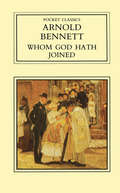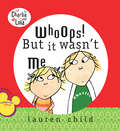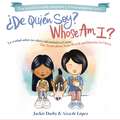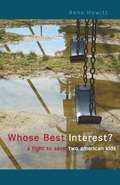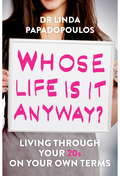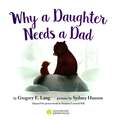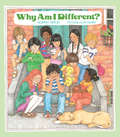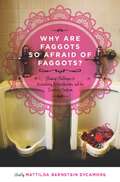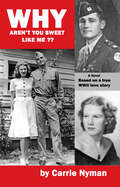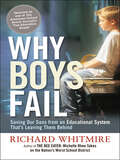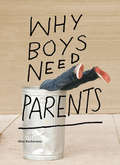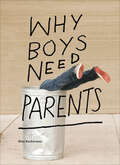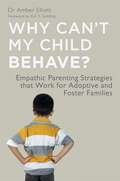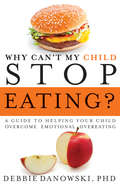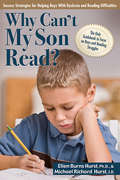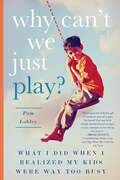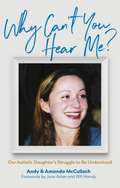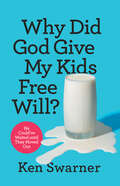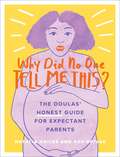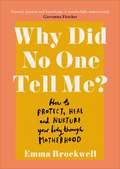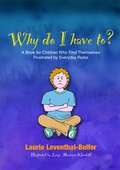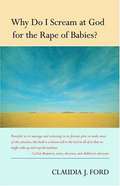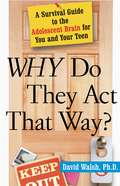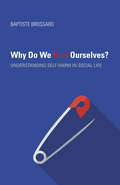- Table View
- List View
Whom God Hath Joined
by Arnold BennettA strong novel about two couples in the process of getting divorced and how divorce is seen in the early 20th century.
Whoops! But It Wasn't Me (Charlie and Lola)
by Lauren ChildCharlie has this little sister, Lola. Lola has been playing with Charlie’s very special rocket. Charlie says, “Did you break my rocket?” Lola says, “You absolutely told me to not ever never touch it… ever.”
Whose Am I? (Bilingual) /¿De quién soy? (Bilingüe): The truth about your worth and identity in Christ / La verdad sobre tu valor e identidad en Cristo
by Jackie Darby Aixa de LópezWhose Am I? /¿De quién soy? shares true life experiences about adoption, redemption, and finding our true identity in Christ, while providing opportunities to ask questions and engage in conversations that are often difficult for families to address.In Whose Am I? we meet two characters whose lives are intertwined due to a strong bond formed by their adoption stories: Darly, a pre-adolescent girl with a thousand questions and feelings surrounding her story, and Jackie, her mentor and good friend, who has a beautiful and powerful testimony to share with her. Throughout their interaction, we learn that Jackie was abandoned in a dump and miraculously found by a missionary nurse who took her in an orphanage, which is contacted by a foreign couple wishing to adopt.Whose Am I? is perfect for:Adopted or foster childrenParents of adoptive or foster childrenParents hoping to adoptChildren wanting to understand adoptionStructured in six sections to be read between parents and children, this book features:Bilingual text (English and Spanish)Illustrations by Aixa de López, speaker, author, illustrator and… Darly&’s mom!Reflections and prayersWhose Am I? /¿De quién soy?Whose Am I? /¿De quién soy? comparte experiencias vitales reales sobre la adopción, la redención y la búsqueda de nuestra verdadera identidad en Cristo, al tiempo que ofrece oportunidades para formular preguntas y entablar conversaciones que a menudo resultan difíciles de abordar para las familias.Darly se miró al espejo y se preguntó: &“Realmente, ¿de quién soy?&”. Había muchas cosas que no sabía sobre su propia historia. Cada vez que pensaba en su vida, le parecía un rompecabezas con piezas que faltaban. Ella añoraba conocer y comprender todos los detalles de los primeros días y años de su vida. Deseaba que alguien pudiera contarle la historia completa.En ¿De quién soy? conocemos a dos personajes cuyas vidas están entrelazadas debido a un fuerte vínculo formado por sus historias de adopción: Darly, una niña preadolescente con mil preguntas y sentimientos que rodean su historia, y Jackie, su mentora y buena amiga, que tiene un testimonio hermoso y poderoso que compartir con ella. A lo largo de su interacción nos enteramos de que Jackie fue abandonada en un basurero, donde milagrosamente una enfermera misionera la encontró y la llevó a un orfanato, el cual fue contactado por una pareja extranjera que deseaba adoptar.¿De quién soy? Es perfecto para:Hijos adoptados o de acogidaPadres de hijos adoptivos o acogidosPadres que esperan adoptarNiños que quieren comprender la adopciónEstructurado en seis secciones para ser leído entre padres e hijos, este libro incluye:Texto bilingüe (inglés y español)Ilustraciones de Aixa de López, conferencista, oradora, ilustradora… ¡y mamá de Darly!Reflexiones y oracionesJackie y Aixa, ambas voluntarias de la Alianza Cristiana para los Huérfanos en Latinoamérica, sueñan con muchas más historias de personas que tuvieron orígenes difíciles y han sido redimidas, mientras ayudan a más niños, jóvenes y padres a caminar con gozo y verdad en medio del quebranto y la belleza de la adopción.
Whose Best Interest: A Fight to Save Two American Kids
by Rene HowittWe have approximately 500,000 children in this country living in foster homes, kinship homes, or group homes. There are probably another 500,000 that should be in the system, however, there is just no place to send them. In author Rene Howitt's book, Whose Best Interest, she tells the true story of a fight to save two children from abuse and neglect. Parents are given one chance after another to put their lives together. Children are taken away from their parents, only to be returned to them time and again. The children become like ping-pong balls bounced back and forth between these temporary homes and then back to their parents. By the time that Family Services concludes that there is no changing the parents, years have passed by and the children are irreparably damaged.
Whose Life Is It Anyway?: Living Life on Your Own Terms
by Dr Linda PapadopoulosLife is full of opportunity for 20-somethings, but it's also far more pressured than ever before. Whether it's the proliferation or the homogeneity of images of beauty and success that wallpaper our world, we know what a beautiful woman looks like - and we know what a perfect life looks like too. We live in a world that floods us with expectations about everything - from what we should weigh to what we should wear to how often we should be having sex and how much money we should be making. As a consequence, we begin to feel that we need to tick all these boxes in order to have 'the Perfect Life'. When we inevitably fall short, we feel anxious - we feel that we are failing and have the sense we are losing control. As a result, increasing numbers of young women are battling with issues such as anxiety, low self-esteem, bullying, perfectionism, toxic friendships and relationships, pressure to succeed or conform, and poor body image. At an age when life should be exciting, fun and relatively care-free, more and more young women are adrift and struggling. Dr Linda Papadopoulos understands the issues and has the experience to guide and support young women to help get their lives back on track so they can feel happier, more confident, more in control. Whose Life Is It Anyway? offers valuable insight and practical self-help to empower women to throw off the burden of expectation and start leading the lives they want to lead.
Why A Daughter Needs A Dad: 100 Reasons
by Gregory E. LangA New York Times and USA Today bestseller! The perfect Christmas gift of love or sweet keepsake for a daughter of any age to show why Dad is so amazing! This new picture book for kids ages 3-7 and beyond is a touching story showing all the ways a father will help his daughter grow. This is the gift for every girl dad and little girl to celebrate their special bond! Featuring charming animal illustrations and heartwarming rhymes about the moments fathers and daughters share, Why a Daughter Needs a Dad is the perfect story to connect father and child together.
Why Am I Different?
by Dora Leder Norma SimonPortrays everyday situations in which children see themselves as "different" in family life, preferences, and aptitudes, and yet, feel that being different is all right.
Why Are Boys So Weird? (Tales From Third Grade #3)
by Candice F. RansomBoys Are So Weird! It's Valentine's Day, and Amber Cantrell is in the mood for romance! Amber gets a funny feeling whenever she's around her classmate, David Jackson. And David seems to think Amber is pretty special, too! But if David likes Amber, then why is he paying so much attention to Delight Wakefield? Amber's jealousy threatens to end her friendship with Delight--until David double-crosses both girls. Now it's time for Amber and Delight to forget their rivalry and team up to teach David a lesson he'll never forget! RL: 3.3 Ages 7-9 There are four books in the Tales From Third Grade series about the kids in this book. look for #1 Who Needs Third Grade? and #2 Third Grade Stars with #4 Third Grade Detectives on the way.
Why Are Faggots So Afraid of Faggots?: Flaming Challenges to Masculinity, Objectification, and the Desire to Conform
by Mattilda Bernstein SycamoreGay culture has become a nightmare of consumerism, whether it's an endless quest for Absolut vodka, Diesel jeans, rainbow Hummers, pec implants, or Pottery Barn. Whatever happened to sexual flamboyance and gender liberation, an end to marriage, the military, and the nuclear family? As backrooms are shut down to make way for wedding vows, and gay sexual culture morphs into "straight-acting dudes hangin' out," what are the possibilities for a defiant faggotry that challenges the assimilationist norms of a corporate-cozy lifestyle? Why Are Faggots So Afraid of Faggots? challenges not just the violence of straight homophobia but the hypocrisy of mainstream gay norms that say the only way to stay safe is to act straight: get married, join the military, adopt kids! Mattilda Bernstein Sycamore reinvokes the anger, flamboyance, and subversion once thriving in gay subcultures in order to create something dangerous and lovely: an exploration of the perils of assimilation; a call for accountability; a vision for change. A sassy and splintering emergency intervention! Called "startlingly bold and provocative" by Howard Zinn, and described as "a cross between Tinkerbell and a honky Malcolm X with a queer agenda" by The Austin Chronicle, Mattilda Bernstein Sycamore is undoubtedly one of America's most outspoken queer critics. She is the author of two novels, including, most recently, So Many Ways to Sleep Badly, and is the editor of four nonfiction anthologies, including Nobody Passes: Rejecting the Rules of Gender and Conformity and That's Revolting! Queer Strategies for Resisting Assimilation.
Why Aren't You Sweet Like Me??: A Novel
by Carrie NymanA pair of newlyweds are separated by war in this emotional, evocative novel inspired by a true WWII love story. Camille &“Honey&” Shaughnessy and Don Shepard fall in love and marry on the eve of World War II. As America enters the war, and Don is pressured into the service by his father, the two newlyweds struggle to maintain contact. Thousands of miles away, Don becomes a hero, saving the lives of his comrades—but, Honey worries, will he make it back to her alive? Moving and memorable, Why Aren&’t You Sweet Like Me?? is a novel based on the actual love letters exchanged between the author&’s grandparents.
Why Boys Fail: Saving Our Sons from an Educational System That's Leaving Them Behind
by Richard WhitmireThis book takes a hard look at how this ominous reality came to be, how it has worsened in recent years, and why attempts to resolve it often devolve into finger-pointing and polarizing politics. The signs and statistics are undeniable: boys are falling behind in school. Contrary to conventional wisdom, the biggest culprits are not video games, pop culture, or female-dominated schools biased toward girls. The real problem is that boys have been thrust into a bewildering new school environment that demands high-level reading and writing skills long before they can handle them.In Why Boys Fail, you will understand this misunderstood problem and uncover schools that are getting it right by boosting literacy among the entire student body, using:data,interviews,case studies,and clearheaded analysisAmidst the alarming proof of failure among boys, there are also inspiring case studies of schools where something is going right. Each has come up with realistic ways to make sure that every student-male and female-has the tools to succeed in school and later in life.Educators and parents alike will take heart in these promising developments and heed the book's call to action, not only to demand solutions but also to help create them for their own students and children.
Why Boys Need Parents
by Alex BeckermanBoys will be boys. Unfortunately, they will also be arsonists, wrecking balls, flooders, and eight-limbed ninjas of destruction. It is their nature. With photos pulled from the 1950s on, this book celebrates the wacky, illogical, dangerous, and ridiculous things boys do. Parents everywhere will laugh in recognition at each bit of mischief and misadventure—all proof that boys really do need parents.
Why Boys Need Parents
by Alex BeckermanHilarious photos of mishaps and messes that remind us why boys need adult supervision . . . Boys will be boys. Unfortunately, they will also be arsonists, wrecking balls, and eight-limbed ninjas of destruction. Their impulse to experiment and explore has given us electricity, space exploration, and the polio vaccine. It has also given us Chernobyl, telemarketing, and countless bathroom floods. With photos pulled from the 1950s on, this book celebrates the wacky, illogical, dangerous, and ridiculous things boys do. Moms and dads everywhere will laugh in recognition at each bit of mischief and misadventure—proof that boys really do need parents.
Why Can't My Child Behave?: Empathic Parenting Strategies that Work for Adoptive and Foster Families
by Amber Elliott'Parenting a child who doesn't know how to be parented is the most difficult job in the world.' Why Can't My Child Behave? provides friendly expert advice on how to respond to difficult behaviours and emotions for parents of children with developmental trauma. Each chapter focusses on the common difficulties faced by carers or parents and features quick, applicable ideas with exercises and illustrations. How do you react to a child's difficult behaviour? How do you deal with your own negative emotions? How do you know when to be empathic? The book looks beyond the traditional punishment/reward strategies and aims to provide an explanation for such questions whilst helping the child in the process. This book will prove to be an invaluable resource for parents, foster carers, social workers and professionals working with children who are adopted or fostered.
Why Can't My Child Stop Eating?
by Debbie DanowskiHelp for parents that tackles the real causes of childhood obesity and offers practical solutions. Why Can't My Child Stop Eating examines the emotional roots of overeating and addresses the social, emotional, and physical problems of these children and their families.With the ever-growing childhood obesity problem, the audience for this book continues to develop. Why Can't My Child Stop Eating? provides parents with specific activities to assist in addressing and healing the emotional aspects of obesity. Currently there is no book on the market that provides assistance in coping with the emotional issues of obesity that offers an emotional recovery plan for children.Debbie Danowski, PhD, is co-author of the previously published Why Can't I Stop Eating? (Hazelden Publishing, 2000), in which she outlined her personal physical, emotional, and spiritual food addiction recovery program that resulted in her losing more than 150 pounds over seventeen years ago. She is a regular guest on both national and international radio programs. Why Can't I Stop Eating? was Hazelden's best-selling trade book in the summer of 2000. The book is currently in its third printing.
Why Can't My Son Read?
by Ellen Burns Hurst Michael Richard HurstWhy Can't My Son Read? offers a practical view of dyslexia written for parents of boys who struggle with reading. Boys are kept back in schools at twice the rate of girls, they get expelled from preschool nearly five times more often than girls, they are diagnosed with learning disorders and attention problems at nearly four times the rate of girls, and they do less homework and get a greater proportion of low grades. This book will teach parents the components of the reading process, along with exploring the intersection of reading, attention, and executive functions. The importance of competition and active engagement for boys with dyslexia is dissected by looking at both sides of the competition debate. Specific checklists and guidelines to support boys' reading improvement are provided, and an additional chapter is included for parents seeking special education services for their sons, with "tricks of the trade" to get and keep the process moving.
Why Can't We Just Play?: What I Did When I Realized My Kids Were Way Too Busy
by Pam LobleyFacing summer with her two boys, ages ten and seven, Pam Lobley was sifting through signups for swim team, rec camp, night camp, scout camp, and enrichment classes. Overwhelmed at the choices, she asked her sons what they wanted to do during summer: “Soccer? Zoo School? Little Prodigy’s Art Club?”“Why can’t we just play?” they asked.A summer with no scheduled activities at all . . . The thought was tempting, but was it possible? It would be like something out of the 1950s. Could they really have a summer like that?Juggling the expectations of her husband (“Are you going to wear garters?”), her son, Sam (“I’m bored!”), and her son, Jack (“Can I just stay in my pajamas?”), Pam sets out to give her kids an old-fashioned summer. During the shapeless days, she studies up on the myths and realities of the 1950s. With her trademark wit and candor, she reveals what we can learn from those long-ago families, why raising kids has changed so drastically, and most importantly, how to stop time once in a while and just play.
Why Can’t You Hear Me?: Our Autistic Daughter’s Struggle to Be Understood
by Andrew McCulloch Amanda McCullochIn the early hours of 28th July 2016, Colette McCulloch was hit by a lorry and killed on the A1. Eighteen hours earlier she had walked out of the specialist care facility for autistic adults where she was being treated. Here, Andy and Amanda McCulloch tell the story of their daughter's life and untimely death: the years in which her autism went undiagnosed, her lifelong battle with eating disorders and the lack of support for her complex needs. The book is interspersed with Colette's own vivid and eloquent writing, her poetry and prose articulating her experiences grappling with a world forever at odds with her. Colette's story is a call to action and ultimately leaves a message of hope for a future in which autistic people will be better understood and able to flourish.
Why Did God Give My Kids Free Will?: He Could've Waited until They Moved Out
by Ken SwarnerDo you sometimes wonder about God&’s plan, specifically why He gave our children free will to do the things they do? More thoughtful and holy thinkers have tackled the question. It&’s a mystery, mostly, but in its raw form, parental mishaps help us get closer to God. Consider: Learning patience while spitwads land in your drinkEmbracing the absurdity of teens wearing shorts in the winterPracticing gentleness as you explain (again) why it is important to restock the toilet paper Regret, humiliation, control … you can let go of these when you laugh and make peace with the idea that God may just have a sense of humor after all. With anecdotes, prayers, devotionals, and reflections, Why Did God Give My Kids Free Will? shows readers the hilarious, spiritual journey of life with kids sure to inspire and unite Christian parents.
Why Did No One Tell Me This?: The Doulas' (Honest) Guide for Expectant Parents
by Natalia Hailes Ash SpivakFull of honest advice and inclusive options, Why Did No One Tell Me This? is the funny, personality-filled, illustrated guide to pregnancy, birth, and beyond that modern parents have been waiting for. Pregnancy and childbirth are full of big questions -- what if my baby is enormous? Will my water break naturally? What even goes into a 'birth plan'? How on earth am I going to keep this child alive once it's here? And where do I turn for advice that will really work for me and my life? In Why Did No One Tell Me This? doulas and reproductive health experts Natalia Hailes and Ash Spivak answer these questions and more for today's wellness-focused, intersectional parents-to-be. Drawing on years of experience in their birth doula practice Brilliant Bodies, Natalia and Ash guide readers through the entire process, from the earliest stages of pregnancy to the jungle of postpartum feelings and responsibilities. Bite-sized pieces of advice are interspersed with vibrant illustrations by artist Louise Reimer to break down the doubts and fears that often surround childbirth, empowering readers to explore their own individual needs, know their rights, and find their voice both during and after pregnancy. By addressing common fears, incorporating regular tips for partners, and providing information on a wide array of birth and parents styles, this unique and inclusive guide is the perfect tool for a new generation of parents.
Why Did No One Tell Me?: How to Protect Heal and Nurture Your Body Through Motherhood
by Emma Brockwell***WINNER OF THE ACTIVE PREGNANCY FOUNDATION AWARDS 2023 'PRODUCT OF THE YEAR’***A reassuring, no-nonsense guide to caring for your body before, during and after giving birth. For too long, women have been told that debilitating conditions following pregnancy are normal, to be expected, and something to just put up with. Emma Brockwell is on a mission to change this. Having been through two difficult pregnancies herself, Emma combines her expertise as a specialist women’s health physiotherapist with personal experience to create a warm, honest, informative and essential handbook to help pregnant women and new mums take control and care for their changing bodies. Find out how to:-Protect your pelvic floor-Heal effectively from birth – both vaginal deliveries and caesarean sections-Tackle common - and TREATABLE - post-birth problems-Exercise safely after birthEvery woman has the right to be informed and this empowering guide gives you all the tools you need to look after your amazing body throughout motherhood.
Why Do I Have To?: A Book for Children Who Find Themselves Frustrated by Everyday Rules
by Laurie Leventhal-Belfer Luisa Montaini-Klovdahl'If you want a child with Asperger's syndrome to comply with a social or family rule, it is very important to explain the logical reason to comply. Laurie's book provides the logic for compliance that will be invaluable for parents and teachers. I know this book will become regular bed time reading and be used many times at home and at school.' - Professor Tony Attwood 'Dr. Laurie clearly understands how children with limited flexibility and difficulty coping think and respond. She has used her clinical experience to teach us how to help these children succeed. Dr. Laurie has provided a format, similar to Social Stories (TM), for reducing stress in daily life and for minimizing conflict stemming from unwritten or everyday rules. While there is no one solution for every child, the stories can be easily adapted for each child. She encourages children to be participants in determining solutions to their problems by providing simple, not simplistic, methods that work.' -Teri Wiss, M.A., O.T.R./L., Director of Development is CHILD'S PLAY! Why do I have to go to school before the show that I am watching is over? Why do I have to wear shoes and a jacket when I go outside? Rules like these can be really frustrating - but they don't have to be! Why do I have to? looks at a set of everyday situations that provide challenges for children at home, with their friends, and at school. Laurie Leventhal-Belfer empathizes with children's wish to do things their way, explains clearly why their way does not work, and provides a list of practical suggestions for how to cope with these challenges and avoid feelings of frustration. This is the ideal book for children who have difficulty coping with the expectations of daily living, as well as for their parents and the professionals who work with them.
Why Do I Scream at God for the Rape of Babies?
by Claudia J. FordAt the center of Why Do I Scream at God for the Rape of Babies? is the tragic story of a five-month-old South African baby named Vyanna who is left alone in a Johannesburg porn theater by her homeless mother and then gang-raped. The story's heart, however, is one of healing, courage and growing love that Vyanna's adoptive mother experiences from the moment she sees the little girl. Journal entries, letters to friends and South African courts, and memories weave together Ford's two-year chronicle of a most unusual—and rewarding—mother-daughter relationship.
Why Do They Act That Way? A Survival Guide to the Adolescent Brain for You and Your Teen
by David Walsh Nat BennettIn this national bestseller, acclaimed, award-winning psychologist Dr. David Walsh explains exactly what happens to the human brain on the path from childhood into adolescence and adulthood. Revealing the latest scientific findings in easy-to-understand terms, Dr. Walsh shows why moodiness, quickness to anger and to take risks, miscommunication, fatigue, territoriality, and other familiar teenage behavior problems are so common -- all are linked to physical changes and growth in the adolescent brain. Why Do They Act That Way?is the first book to explain the changes in teens' brains and show parents how to use this information to understand, communicate with, and stay connected to their kids. Through real-life stories, Dr. Walsh makes sense of teenagers' many mystifying, annoying, and even outright dangerous behavioral difficulties and provides realistic solutions for dealing with everyday as well as severe challenges. Dr. Walsh's techniques include, among others: sample dialogues that help teens and parents talk civilly and constructively with each other, behavioral contracts, and Parental Survival Kits that provide practical advice for dealing with issues like curfews, disrespectful language and actions, and bullying. With this arsenal of strategies, parents can help their kids learn to control impulses, manage erratic behavior, cope with their changing bodies, and, in effect, develop a second brain.
Why Do We Hurt Ourselves?: Understanding Self-Harm in Social Life
by Baptiste BrossardWhy does an estimated 5% of the general population intentionally and repeatedly hurt themselves? What are the reasons certain people resort to self-injury as a way to manage their daily lives? In Why Do We Hurt Ourselves, sociologist Baptiste Brossard draws on a five-year survey of self-injurers and suggests that the answers can be traced to social, more than personal, causes. Self-injury is not a matter of disturbed individuals resorting to hurting themselves in the face of individual weaknesses and difficulties. Rather, self-injury is the reaction of individuals to the tensions that compose, day after day, the tumultuousness of their social life and position. Self-harm is a practice that people use to self-control and maintain order—to calm down, or to avoid "going haywire" or "breaking everything." More broadly, through this research Brossard works to develop a perspective on the contemporary social world at large, exploring quests for self-control in modern Western societies.
